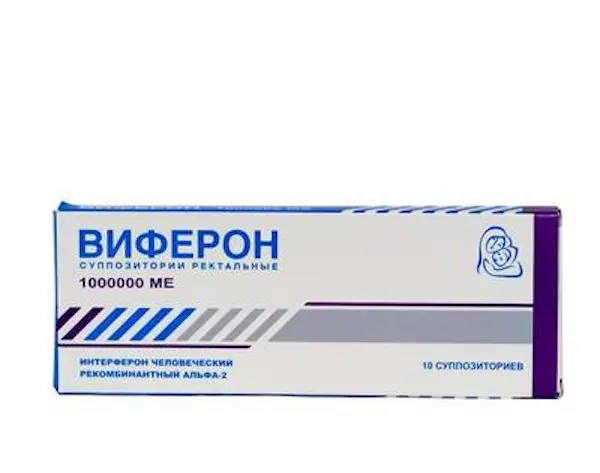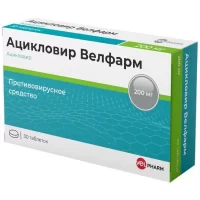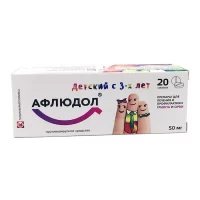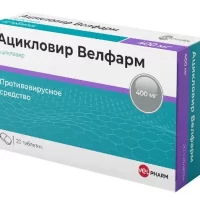Description
Viferon Pharmacodynamics
Human recombinant interferon alfa-2b has antiviral, immunomodulatory, antiproliferative properties, inhibits the replication of RNA- and DNA-containing viruses. The immunomodulatory properties of interferon alfa-2b, such as increasing the phagocytic activity of macrophages, increasing the specific cytotoxicity of lymphocytes to the target cells, determine its mediated antibacterial activity
In the presence of ascorbic acid and alpha-tocopherol acetate the specific antiviral activity of interferon
alpha-2b, its immunomodulatory effect is increasing, which allows to increase the effectiveness of the body’s own immune response to pathogens. When using the drug the level of secretory immunoglobulin class A increases, the level of immunoglobulin E normalizes, the functioning of the endogenous system of interferon alpha-2b is restored. Ascorbic acid and alpha-tocopherol acetate, being highly active antioxidants, possess anti-inflammatory, membrane stabilizing and regenerating properties. It was found that using VIFERON® has no side effects that appear during parenteral administration of interferon-alpha-2b preparations, no antibodies are formed that neutralize antiviral activity of interferon
alpha-2b. The use of VIFERON® in combination therapy reduces the therapeutic doses of antibacterial and hormonal drugs, and also reduces the toxic effects of such therapy
Cocoa butter contains phospholipids, which allows not to use synthetic toxic emulsifiers, and the presence of polyunsaturated fatty acids facilitates the introduction and dissolution of the preparation.
Indications
-Acute respiratory viral infections, including influenza, including those complicated by bacterial infection, pneumonia (bacterial, viral, chlamydial) in children and adults in the complex therapy;
-infectious and inflammatory diseases of newborn children, including premature babies: meningitis (bacterial, viral), sepsis, intrauterine infection (chlamydia, herpes, cytomegalovirus infection, enterovirus infection, candidiasis, including visceral, mycoplasmosis) in the complex therapy;
-Chronic viral hepatitis B, C, D in children and adults in combination therapy, including in combination with plasmapheresis and hemosorption in chronic viral hepatitis of marked activity, complicated liver cirrhosis
-Infectious and inflammatory diseases of the urogenital tract (chlamydia, cytomegalovirus infection, ureaplasmosis, trichomoniasis, gardnerellosis, papillomavirus infection, bacterial vaginosis, recurrent vaginal candidiasis, mycoplasmosis) in adults as part of complex therapy;
-Primary or recurrent herpes infection of the skin and mucous membranes, localized form, mild to moderate course, including urogenital form in adults;
-Viral meningitis in children aged 4 years and older in combination therapy.
Contraindications
Hypersensitivity to any of the components of the drug.
How to use and dosages
- The drug is applied rectally. As an active ingredient, one suppository contains human recombinant interferon alpha-2b in the indicated dosages (150 000 IU, 500 000 IU, 1 000 000 IU, 3 000 000 IU).
- Acute respiratory viral infections, including influenza, including those complicated by bacterial infection, pneumonia (bacterial, viral, chlamydial) in children and adults in combination therapy.
- The recommended dose for adults, including pregnant women and children over 7 years old VIFERON® 500 000 IU 1 suppository 2 times per day every 12 hours daily for 5 days.
- If clinically indicated, therapy may be continued.
- In children under 7 years old, including newborns and prematurely born with gestational age more than 34 weeks, it is recommended to use VIFERON® 150 000 IU 1 suppository 2 times per day every 12 hours daily during 5 days. If clinically indicated, therapy can be continued. The break between the courses is 5 days.
- To premature infants with gestational age less than 34 weeks, it is recommended to use VIFERON® 150 000 IU 1 suppository 3 times per day every 8 hours daily during 5 days. The therapy can be continued if clinically indicated. The break between the courses is 5 days.
- Infectious and inflammatory diseases of newborn children, including premature infants: meningitis (bacterial, viral), sepsis, intrauterine infection (chlamydia, herpes, cytomegalovirus infection, enterovirus infection, candidiasis, including visceral, mycoplasmosis) in the complex therapy.
- Recommended dose for newborn infants, including premature infants with gestational age of more than 34 weeks, VIFERON® 150 000 IU daily – 1 suppository twice a day every 12 hours. The course of treatment is 5 days.
- Use of VIFERON® 150 000 ME daily in 1 suppository 3 times daily every 8 hours is recommended for premature newborn infants with gestational age less than 34 weeks. The course of treatment is 5 days.
- Recommended number of courses for various infectious and inflammatory diseases: sepsis – 2-3 courses, meningitis – 1-2 courses, herpes infection – 2 courses, enterovirus infection – 1-2 courses, cytomegalovirus infection – 2-3 courses, mycoplasmosis, candidiasis, including visceral candidiasis – 2-3 courses. The break between courses is 5 days. Therapy may be continued under clinical indications.
- Chronic viral hepatitis B, C, D in children and adults as part of complex therapy, including combination with plasmapheresis and hemosorption in chronic viral hepatitis of expressed activity complicated by cirrhosis.
- Recommended dose for adults is VIFERON® 3 000 000 IU – 1 suppository 2 times per day every 12 hours daily during 10 days, further three times per week every other day during 6-12 months. Duration of treatment is determined by clinical efficacy and laboratory values.
- It is recommended 300,000-500,000 IU daily for children under 6 months of age; 500,000 IU daily for children 6 to 12 months of age.
For children aged 1 to 7 years, 3,000,000 IU per 1 m2 of body surface area per day is recommended. - Children over 7 years of age are recommended 5,000,000 IU per 1 m2 of body surface per day.
- The drug is used 2 times a day, 12 hours every other day during the first 10 days, then three times a week every other day for 6-12 months. Duration of treatment is determined by clinical efficacy and laboratory values.
- Calculation of a daily dose of the drug for each patient is performed by multiplying the recommended dose for a given age by the body surface area calculated using a nomogram to calculate the body surface area by height and weight according to Garford, Terry and Rourke. The single dose is calculated by dividing the calculated daily dose by 2 injections, the resulting value is rounded to the suppository dosage upwards.
- In chronic viral hepatitis with severe activity and cirrhosis, before plasmapheresis and/or hemosorption, administration of 150,000 IU VIFERON® is recommended for children under 7 years old, 500,000 IU VIFERON® 1 suppository 2 times per day every 12 hours daily for 14 days at age over 7 years old.
- Infectious and inflammatory diseases of the urogenital tract (chlamydia, cytomegalovirus infection, ureaplasmosis, trichomoniasis, gardnerellosis, papillomavirus infection, bacterial vaginosis, recurrent vaginal candidiasis, mycoplasmosis) in adults, including pregnant women in complex therapy.
- The recommended dose for adults is VIFERON® 500 000 IU 1 suppository 2 times per day every 12 hours daily for 5-10 days. If clinically indicated, therapy may be continued.
- It is recommended that since the second trimester of pregnancy (starting from 14 weeks of gestation) the preparation VIFERON® 500 000 ME by 1 suppository 2 times per day every 12 hours daily during 10 days, and then during 9 days 3 times with an interval of 3 days (on the fourth day) by 1 suppository 2 times a day every 12 hours. Then every 4 weeks until delivery VIFERON® 150 000 IU 1 suppository 2 times a day every 12 hours daily for 5 days. If necessary, VIFERON® 500 000 IU 1 suppository 2 times per day every 12 hours daily for 10 days before childbirth is indicated (from 38 weeks of gestation).
- Primary or recurrent herpetic skin and mucous membrane infection, localized form, mild to moderate course, including urogenital form in adults, including pregnant women.
- Recommended dose for adults is VIFERON® 1 000 000 IU 1 suppository 2 times per day every 12 hours daily for 10 days or more in case of recurrent infection. Therapy may be continued if clinically indicated. It is recommended to start treatment as soon as the first signs of skin and mucous membrane lesions (itching, burning, redness) appear. When treating recurrent herpes, it is advisable to start treatment in the prodromal period or at the very beginning of signs of recurrence.
- It is recommended that since the second trimester of pregnancy (starting from 14 weeks of gestation), VIFERON® 500 000 ME 1 suppository 2 times per day every 12 hours daily for 10 days, and then for 9 days, 3 times with an interval of 3 days (on the fourth day) 1 suppository 2 times per day every 12 hours. Then every 4 weeks until delivery VIFERON® 150 000 IU 1 suppository 2 times a day every 12 hours daily for 5 days. If necessary, VIFERON® 500 000 IU 1 suppository 2 times per day every 12 hours daily for 10 days before childbirth is indicated (from the 38th week of gestation).
- Viral meningitis in children aged from 4 years as part of complex therapy.
- Recommended dose for children from 4 to 11 years of age inclusive – VIFERON® 1 000 000 IU 1 suppository 2 times per day every 12 hours daily for 7 days, further 1 000 000 IU 1 suppository 1 time per day (at night) daily for 7 days.
- For children aged 12-18 years old – VIFERON® 3 000 000 IU 1 suppository 2 times per day every 12 hours every day for 7 days, further 3 000 000 IU 1 suppository 1 time per day (at night) daily for 7 days.





